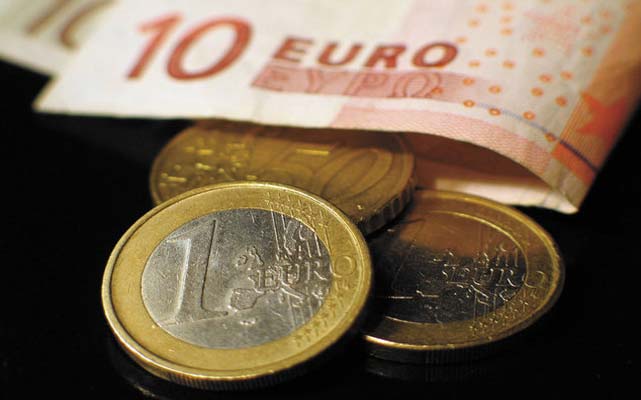Pound Euro (GBP/EUR) Exchange Rate Trends in Narrow Range on Energy Concerns
August 15, 2022 - Written by John Cameron

The Pound Euro (GBP/EUR) exchange rate is trading sideways today as both currencies face headwinds over rising energy costs. A lack of significant data also weighs upon trading sentiment, leaving the Pound (GBP) and the Euro (EUR) exposed to losses against their peers.
At the time of writing, GBP/EUR is trading at €1.1845, up 0.2% from today’s opening levels.
The Pound is weakening against several of its rival currencies this morning as fresh concerns regarding the rising price of energy in the UK weigh upon Sterling.
According to the Institute for Fiscal Studies (IFS), the UK government will need to invest another £12bn to achieve the aid package announced by the former UK Chancellor Rishi Sunak in May.

Sunak told MPs earlier in the year that the government’s aim was to make up for half the cost of energy price increases to households – an amount subsequently calculated at £24bn. This entailed an energy discount for all households, with extra support for those on benefits and in council tax bands A-D.
However, costs have continued to escalate to the point that energy bills are expected to more than double this winter.
The director of the IFS notes:
‘The government is still playing catch up as inflation and the cost of energy continue to spiral upwards. Just achieving what they wanted to achieve back in May will cost an additional £12bn, and a package on that scale will still leave many households much worse off.’
As yet, contestants for the position of UK Prime Minister have not stepped up to the challenge, although Rishi Sunak has pledged to spend approximately £10bn on the crisis.
In contrast, Labour Leader Sir Keir Starmer has proposed his plan to freeze UK energy bills, at a cost of £29bn. The politician says the funds could be raised by extending the scope of the windfall tax on energy companies, halting the proposed £400 payments for all households and lowering government interest payments on debt.

The Euro is finding intermittent strength against its peers, but gains are capped by a lack of domestic data and energy supply concerns. Also denting the single currency is a stronger US Dollar.
Ongoing fears of a recession continue to dampen support for EUR, as a recent poll conducted by Bloomberg indicates an economic contraction in the Eurozone is now more likely than not.
The survey concludes:
‘The probability of output shrinking for two straight quarters has risen to 60% from 45% in a previous survey, and up from 20% before Russia invaded Ukraine.’
Further fuelling recessionary fears is a slowdown in China’s economy – the world’s second largest. An economic contraction in such a large global player is likely to have ripple effects, especially considering China’s trading relationship with Europe.
Elsewhere, energy shortages dispense gloom throughout the Eurozone. Wholesale gas prices are hovering around eight times higher than the average level of recent years; the South-eastern territory of Kosovo is enforcing intermittent power cuts to conserve dwindling energy ahead of winter.
A spokesperson for Kosovo’s energy distribution company, KEDS, told Reuters: ‘Consumers will have six hours on and two hours off.’ The power utility KEK says it has shut down almost half its coal generators to prepare them for the colder weather.
Other European nations are taking different measures to conserve energy. In Spain, businesses are required to turn off their lights overnight, while Germany is incentivising the use of public transport.
Nevertheless, the International Monetary Fund (IMF) estimated last month that the median high income European country has already spent an extra 1% of annual national income on energy price support.
Looking ahead, tomorrow’s jobs report from the UK may trigger an upside in Sterling exchange rates, if regular pay increased more in the three months to June than in the three months to May. The average income – excluding bonuses – is forecast to print at 4.5%.
Potentially capping GBP gains, however, is the likelihood that real wages went down once adjusted for inflation. Inflation-adjusted regular pay in the lead up to May fell by the largest drop on record, amid the UK’s cost-of-living crisis.
Elsewhere, Europe’s trade deficit is expect to reduce, which could buoy the Euro, while Germany’s economic sentiment index also looks to have improved – though remaining deep in negative territory.
STORY LINK Pound Euro (GBP/EUR) Exchange Rate Trends in Narrow Range on Energy Concerns

GBP/EUR Exchange Rate Wavers as Energy Concerns Prevail
The Pound Euro (GBP/EUR) exchange rate is trading sideways today as both currencies face headwinds over rising energy costs. A lack of significant data also weighs upon trading sentiment, leaving the Pound (GBP) and the Euro (EUR) exposed to losses against their peers.
At the time of writing, GBP/EUR is trading at €1.1845, up 0.2% from today’s opening levels.
Pound (GBP) Subdued by Downbeat Forecasts
The Pound is weakening against several of its rival currencies this morning as fresh concerns regarding the rising price of energy in the UK weigh upon Sterling.
According to the Institute for Fiscal Studies (IFS), the UK government will need to invest another £12bn to achieve the aid package announced by the former UK Chancellor Rishi Sunak in May.

Sunak told MPs earlier in the year that the government’s aim was to make up for half the cost of energy price increases to households – an amount subsequently calculated at £24bn. This entailed an energy discount for all households, with extra support for those on benefits and in council tax bands A-D.
However, costs have continued to escalate to the point that energy bills are expected to more than double this winter.
The director of the IFS notes:
‘The government is still playing catch up as inflation and the cost of energy continue to spiral upwards. Just achieving what they wanted to achieve back in May will cost an additional £12bn, and a package on that scale will still leave many households much worse off.’
As yet, contestants for the position of UK Prime Minister have not stepped up to the challenge, although Rishi Sunak has pledged to spend approximately £10bn on the crisis.
In contrast, Labour Leader Sir Keir Starmer has proposed his plan to freeze UK energy bills, at a cost of £29bn. The politician says the funds could be raised by extending the scope of the windfall tax on energy companies, halting the proposed £400 payments for all households and lowering government interest payments on debt.
Euro (EUR) Falters on Energy Concerns, USD Strength

The Euro is finding intermittent strength against its peers, but gains are capped by a lack of domestic data and energy supply concerns. Also denting the single currency is a stronger US Dollar.
Ongoing fears of a recession continue to dampen support for EUR, as a recent poll conducted by Bloomberg indicates an economic contraction in the Eurozone is now more likely than not.
The survey concludes:
‘The probability of output shrinking for two straight quarters has risen to 60% from 45% in a previous survey, and up from 20% before Russia invaded Ukraine.’
Further fuelling recessionary fears is a slowdown in China’s economy – the world’s second largest. An economic contraction in such a large global player is likely to have ripple effects, especially considering China’s trading relationship with Europe.
Elsewhere, energy shortages dispense gloom throughout the Eurozone. Wholesale gas prices are hovering around eight times higher than the average level of recent years; the South-eastern territory of Kosovo is enforcing intermittent power cuts to conserve dwindling energy ahead of winter.
A spokesperson for Kosovo’s energy distribution company, KEDS, told Reuters: ‘Consumers will have six hours on and two hours off.’ The power utility KEK says it has shut down almost half its coal generators to prepare them for the colder weather.
Other European nations are taking different measures to conserve energy. In Spain, businesses are required to turn off their lights overnight, while Germany is incentivising the use of public transport.
Nevertheless, the International Monetary Fund (IMF) estimated last month that the median high income European country has already spent an extra 1% of annual national income on energy price support.
GBP/EUR Exchange Rate Forecast: UK Employment Data to Inspire Movement?
Looking ahead, tomorrow’s jobs report from the UK may trigger an upside in Sterling exchange rates, if regular pay increased more in the three months to June than in the three months to May. The average income – excluding bonuses – is forecast to print at 4.5%.
Potentially capping GBP gains, however, is the likelihood that real wages went down once adjusted for inflation. Inflation-adjusted regular pay in the lead up to May fell by the largest drop on record, amid the UK’s cost-of-living crisis.
Elsewhere, Europe’s trade deficit is expect to reduce, which could buoy the Euro, while Germany’s economic sentiment index also looks to have improved – though remaining deep in negative territory.
International Money Transfer? Ask our resident FX expert a money transfer question or try John's new, free, no-obligation personal service! ,where he helps every step of the way, ensuring you get the best exchange rates on your currency requirements.
TAGS: Pound Euro Forecasts
Comments are currrently disabled
Related Stories:
- Pound to Euro Forecast: Potential 1-2% GBP Losses Ahead, Warns Bank - July 3, 2025
- Pound to Euro Today: GBP Drifts, EUR Headwinds After EZ Jobs - July 2, 2025
- Pound-to-Euro Forecast: GBPEUR Tipped to FALL to 1.1360 - July 2, 2025
- GBP/EUR Forecast: Eurozone Inflation Hits ECB's 2% target - July 1, 2025
- Pound to Euro Forecast: GBP Battles to Match Turbocharged EUR - July 1, 2025
- Pound to Euro Forecast: EUR can see Further Gains from Here - June 30, 2025
- Pound-to-Euro Rate Slips as UK Disposable Income Slumps - June 30, 2025
- Pound to Euro Week Ahead Forecast: 1.17 Today, 1.19 Next Target - June 30, 2025
- Pound to Euro Forecast: Retreat to 1.1560 by end of 2025 - June 29, 2025
Latest News:
- Pound to Euro Forecast: Potential 1-2% GBP Losses Ahead, Warns Bank - July 3, 2025
- GBP/USD Forecast: Pound Under Pressure vs Dollar ahead of US Jobs Data - July 3, 2025
- Euro to Dollar Forecast: "$1.20 Level Now Very Achievable Later in 2025" - July 2, 2025
- Pound to Dollar Forecast: "GBP Must Break and Hold 1.3800 Soon" - July 2, 2025
- Pound to Euro Today: GBP Drifts, EUR Headwinds After EZ Jobs - July 2, 2025
- Pound-to-Euro Forecast: GBPEUR Tipped to FALL to 1.1360 - July 2, 2025
- Pound to Dollar Forecast: GBP Major Resistance at 1.38 "Out of Reach" - July 2, 2025
- Euro to Dollar Forecast: Another 5pc Fall for USD Around the Corner? - July 1, 2025
- Pound to Euro Forecast: GBP Battles to Match Turbocharged EUR - July 1, 2025
- Dollar Slide Continues, GBP/USD Hits Fresh 44-Month Best - July 1, 2025








